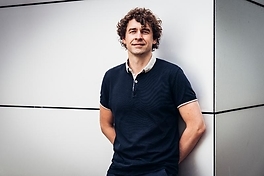Süßmilch Lecture - hybrid
HistoGenes: Ancient genomes provide insights into demographic changes and social structures in the early Middle Ages
Johannes Krause, Max Planck Institute for Evolutionary Anthropology
Online or at Max Planck Institute for Demographic Research, November 20, 2024
The German archaeo- and palaeogeneticist Prof. Dr. Johannes Krause will speak on November 20 as part of the “Süssmilch Lecture” at the MPI for Demographic Research on the topic «HistoGenes: Alte Genome ermöglichen Einblicke in demographische Veränderungen und Sozialstrukturen im Frühmittelalter [“HistoGenes: Ancient genomes provide insights into demographic changes and social structures in the early Middle Ages” ].
The event begins at 2 pm CEST on November 20, 2024.
Abstract
In his lecture, Professor Dr. Johannes Krause will present the Histogenes project, which he leads in collaboration with historians Patrick Geary and Walter Pohl, as well as archaeologist Tivadar Vida. This project sheds light on population changes and living conditions in East-Central Europe during the critical period between the fall of the Western Roman Empire and the formation of medieval states, spanning from the 5th to the 9th century. For the first time, all relevant disciplines for this historical period—archaeology, history, anthropology, and genetics—are being brought together to offer a fresh perspective on one of the most significant crossroads in Europe's population history.
The project genetically analyzed 6,000 burials from between 400 and 900 AD using cutting-edge genomic, archaeological, historical, and anthropological methods. It represents the most ambitious and comprehensive initiative in the emerging field of archaeogenetics, aiming to enhance our understanding of migrations and mobility in the early Middle Ages, and to provide direct insights into the lives of those who traversed or settled in East-Central Europe. Through this research, we gain valuable knowledge about the diet, health, local customs, as well as the family and community structures of that time and region.
About the Speaker

© Thomas Victor
Johannes Krause, born in the GDR in 1980, is one of the directors at the Max Planck Institute for Evolutionary Anthropology in Leipzig. The biochemist’s research focuses on the analysis of ancient genomes. Using DNA sequencing, he investigates historical and prehistoric pathogens, gaining insights into human genetic history and evolution. Among his achievements, Krause contributed to decoding the Neanderthal genome and provided the first genetic evidence of the Denisovans. He identified the origin of the Black Death and other infectious pathogens. Krause’s research extends to the origins and histories of other epidemics such as leprosy, tuberculosis, and syphilis. By analyzing genetic datasets, he examines the structure of European populations, drawing conclusions about migration patterns—such as the Migration Period—and other historical events.
Krause is a sought-after interview partner for television, radio, print, and online media, including The New York Times, The Washington Post, BBC, ARTE, and many others. His two books, Die Reise unserer Gene (2019) and Hybris: Die Reise der Menschheit (2021), have appeared on international bestseller lists.
Krause has published more than 250 scientific papers, including contributions to top-tier international journals like Nature, Science, Cell, and Nature Reviews. His research has earned him numerous awards, such as the Academy Award from the Berlin-Brandenburg Academy of Sciences, the International Fabio Frassetto Prize for Paleoanthropology from the Italian Academy of Sciences (Accademia Nazionale dei Lincei), and the AAAS Newcomb Cleveland Prize. He is a member of the Leopoldina, the Heidelberg Academy of Sciences and Humanities, and a corresponding member of the Center for Academic Research and Training in Anthropogeny (CARTA) and the German Archaeological Institute (DAI).
Participation
Please register via this survey for online participation. The Zoom link will be sent to you afterwards. The event begins at 2 pm CEST on November 20, 2024.